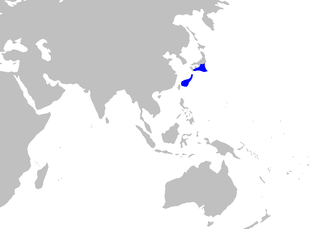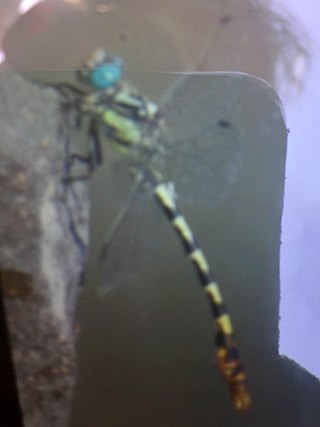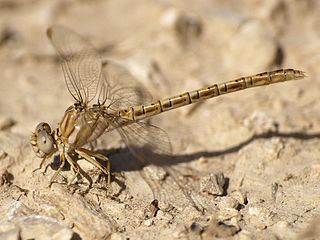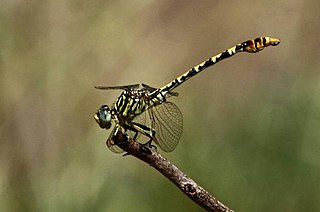The large Palau flying fox is an extinct species of medium-sized megabats from the Palau Islands in Micronesia. It had brownish fur with long, silvery hairs on its belly, and a wingspan of about 60 cm. It probably became extinct around 1874, possibly due to overhunting. It is known from two specimens, one of which is in the Natural History Museum, London.

The salamander shark or salamander catshark is a little known catshark that inhabits a range from Japan and the East China Sea, on the upper to middle continental slope at depths of 358–895 m. Specimens of this species can attain a total length of at least 64 cm. This catshark is a potential bycatch of trawl fisheries operating within its range, but no details are available. There are high levels of squalene in this catshark's liver. The reproduction of this catshark is oviparous.

Rickett's big-footed bat is a species of vesper bat. It can be found in southern and eastern China, Vietnam, and Laos. This species has often been called Myotis ricketti, but the older M. pilosus has priority. The erroneous reporting of the type locality as being in Uruguay by Wilhelm Peters led to the dual naming.

The hairy long-nosed armadillo or woolly armadillo is a species of armadillo in the family Dasypodidae. It is endemic to Peru. Its natural habitats are subtropical or tropical moist lowland forest and subtropical or tropical moist montane forest. The International Union for Conservation of Nature used to consider it a "vulnerable species" but has changed this assessment to "data deficient" because so little is known about the animal and the threats it faces.
Hydrotarsus pilosus is a species of beetle in family Dytiscidae. It is endemic to Canary Islands.

Onychogomphus assimilis is a species of dragonfly in the family Gomphidae. It is found in Armenia, Georgia, Iran, Turkey, and Turkmenistan. Its natural habitat is rivers. It is threatened by habitat loss.

Onychogomphus is a genus of dragonflies in the family Gomphidae. They are commonly known as pincertails.
Onychogomphus bwambae is a species of dragonfly in the family Gomphidae. It is endemic to Uganda. Its natural habitats are subtropical or tropical moist lowland forests and rivers. It is threatened by habitat loss.

Onychogomphus costae is a species of dragonfly in the family Gomphidae. It is found in Algeria, Morocco, Portugal, Spain, and Tunisia. Its natural habitat is rivers. It is threatened by habitat loss.
Onychogomphus kitchingmani is a species of dragonfly in the family Gomphidae. It is endemic to Zambia. Its natural habitat is rivers.
Onychogomphus macrodon, also known as the Levant pincertail, is a species of dragonfly in the family Gomphidae.
Onychogomphus styx is a species of dragonfly in the family Gomphidae. It is found in Kenya, Tanzania, Uganda, Zambia, and possibly Guinea. Its natural habitats are subtropical or tropical moist lowland forests and rivers. It is threatened by habitat loss.

Onychogomphus supinus is a species of dragonfly in the family Gomphidae. English names include lined claspertail and gorge claspertail.
Potamonautes pilosus is a species of crustacean in the family Potamonautidae. It is found in Kenya and Tanzania. Its natural habitat is rivers.

Onychogomphus forcipatus, the small pincertail or green-eyed hook-tailed dragonfly, is a species of dragonfly belonging to the family Gomphidae.

Melligomphus acinaces is a species of dragonfly in the family Gomphidae. It is endemic to the streams of Western Ghats of India. This species was originally described as a Onychogomphus. However, both the pattern and the shape of the anal appendages do not fit Onychogomphus but are very close to those of the species placed in Melligomphus.

Lamelligomphus nilgiriensis is a species of dragonfly in the family Gomphidae. It is endemic to the hill streams of Western Ghats of India. This species has been placed by many authors in Onychogomphus but should be included in Lamelligomphus following Fraser (1934), based on the shape of the male anal appendages.
Onychogomphus malabarensis is a species of dragonfly in the family Gomphidae. It is endemic to the streams of Western Ghats of India.

Nychogomphus striatus is a species of dragonfly in the family Gomphidae. It is endemic to the streams of Western Ghats of India. Reports from Nepal require further studies.











